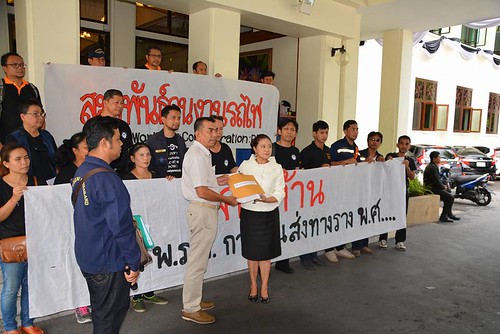Railway workers have urged the junta leader to halt amendment of the railway law, citing lack of public participation.
On 13 July 2017, representatives of Railway Workers’ Confederation (RWC) submitted a petition to Gen Prayut Chan-o-cha, the junta leader and Prime Minister, about the reform of the State Railway of Thailand and the rail transportation system of the country.
Pansak Charoen, the director of People’s Service Centre under the Prime Minister’s Office, accepted the petition. The group also visited the Ministry of Finance, Ministry of Transportation, and the Council of State to submit the petition.
The group are calling on the junta leader to halt the process to amend the Railway Transportation Act.
Suwit Sumanon, the president of the RWC, said the workers agree that the country railway transportation system need reform. However, the process in amending for reform and amending the law must be transparent.
The amendment process should be halted for the time being because all stakeholders, especially people who are going to be affected by it should have an opportunity to participate in the process since the beginning in accordance to Article 77 of the 2017 Constitution, Suwit pointed out.
Recently the government approved the 179 billion baht budget for building a 252-kilometre high-speed railway from Bangkok to the northeastern province of Nakhon Ratchasima after the junta leader controversially invoked his absolute power under Section 44 of the Interim Charter to issue National Council for Peace and Order (NCPO) Head’s Order No.30/2017.
The order clears away legal and technical obstacles to the much delayed project. It mandates the State Railway of Thailand to hire a Chinese state enterprise to supervise the railway project.
Under the order, the Ministry of Transport is required to work with the Chinese firm and Thailand’s councils of engineers and architects. However, the order exempts several articles of the 2000 Architect Act, allowing architects who have not been certified by the Architect Council to work in the project.
Chatree Prakitnonthakarn, an architecture lecturer at Silpakorn University, pointed out that the more worrying issue is the fact that the use of Section 44 to rush the project also overrides several laws related to public procurement, making the railway deal less transparent.

A representative of Railway Workers’ Confederation submitting a petition to the authorities on 13 July 2017 (Photo from RWC's Facebook)

